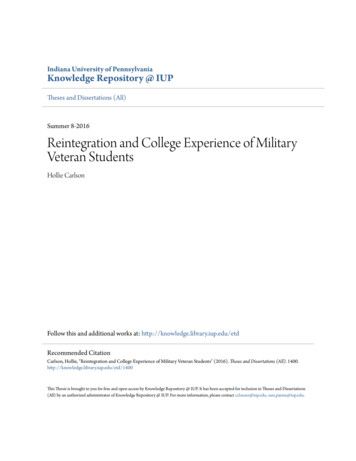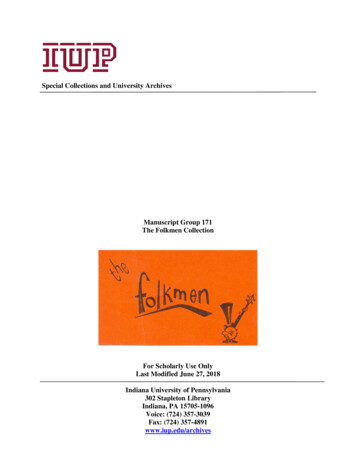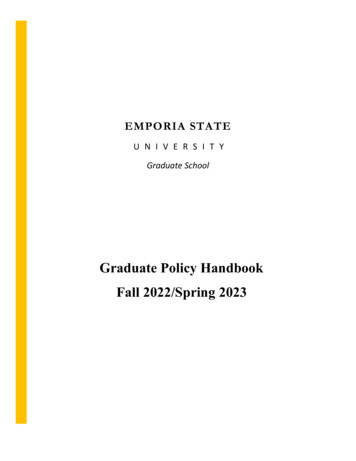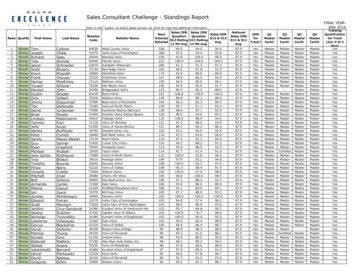
Transcription
IUP Graduate HandbookMaster’s ProgramDepartment of Criminology and Criminal JusticeHandbook Updated: 2020 - 2021
Master’s Program Department of Criminology and Criminal Justice Indiana University of PennsylvaniaMaster’s Program in Criminology (Campus and Online)Department of Criminology and Criminal JusticeWilson Hall Room 200Indiana, PA 15705724-357-2720 Main Office724-357-4018 FaxProgram Website: http://www.iup.edu/criminology/ii
Master’s Program Department of Criminology and Criminal Justice Indiana University of PennsylvaniaTABLE OF CONTENTSIntroduction . 1IUP’s Civility Statement . 2Affirmative Action . 2Title IX Reporting Requirement . 2Student Conduct and Student Rights . 2Department of Criminology and Criminal Justice Master’s Programs . 2Mission Statement and Program Objectives . 3Faculty and Staff . 3Admission . 4Financial Assistance . 4Academic Advisement . 4Campus Resources & Student Support . 5IUP Email . 5Graduate Student Assembly . 5Programs and Degrees . 6Master’s Program . 6Course Descriptions . 7Evaluation of Students . 9Comprehensive/Candidacy Examinations . 9Program Level Examination Appeals . 9Reexamination Policy . 10Degree Completion . 10Thesis Completion (Campus Student Option) . 11Evaluation Outcome for Thesis (Campus Student Thesis Track) . 12University Policy and Procedure. 12Academic Calendar . 12Academic Good Standing . 12Academic Integrity . 12Academic Status and Satisfactory Academic Progress . 13Bereavement-Related Class Absences . 13Continuous Graduate Registration for Dissertation and Thesis . 13Grade Appeal Policy . 14Graduate Fresh Start Policy . 14Graduate Residency Requirement Policy . 15Registration . 16iii
Master’s Program Department of Criminology and Criminal Justice Indiana University of PennsylvaniaSocial Equity . 16Time Limitations . 16Time-to-Degree Masters/Doctoral Dismissal Appeal Policy . 16Time-to-Degree Extension for Master’s Thesis . 17Prior Learning Assessment . 17Research . 18Thesis Proposal Defense Verification. 19Signature Page . 20iv
Master’s Program Department of Criminology and Criminal Justice Indiana University of PennsylvaniaIntroductionWelcome! The faculty members in the Department are confident that you will find this program bothchallenging and rewarding. We look forward to working with you throughout your studies and wish youevery success in earning a Master of Arts degree in Criminology at IUP.The Department of Criminology and Criminal Justice at IUP was established in 1966. In its early years,the department had a law enforcement focus, due in great part to the Law Enforcement AssistanceAdministration’s higher education funding dictates. However, with time, further insight was gained aboutthe total needs of the academic and practice fields of criminology and criminal justice, resulting in astronger, more integrated and broad-based program, encompassing all primary areas of the discipline. In2014, the Department changed its name to the Department of Criminology and Criminal Justice tobetter represent the interrelationship between the two fields. Today, our undergraduate program enrollsapproximately 1000 students – making it one of the largest departments on campus.This expanded focus led to the establishment of a graduate program and a serious commitment toresearch. The M.A. program admitted its first students in the mid-1970’s. In 1986, the universityapproved the creation of a doctoral program. The first class of six doctoral students began studies in thefall of 1988.Associated with the shift to a research orientation, a professional journal and a center for research werecreated. The Criminal Justice Policy Review, housed in the Department of Criminology, released itsinaugural edition in January 1986. That same year, the Center for Research in Criminology (CRC) wasdeveloped and officially recognized as a unit within the Department of Criminology. The CRC operatesas a clearinghouse for justice related research in the department and throughout the university and servesto assist faculty and students in funding and implementing research projects. The department has alsobeen instrumental in the development of the National Institute for Correctional Education, anorganization that provides, among other things, a clearinghouse for information related to successfuleducation programs implemented in prisons and jails.It seems important to mention that all involved in the development and operation of this programrecognize that the maintenance of excellence is an ongoing process. It is their belief that a vital elementof this process is the thoughtful and candid input from students in the program and graduates in thefield. These observations will allow the program to keep abreast of the fluid and ever-changingrequirements of the discipline. Again, welcome!1
Master’s Program Department of Criminology and Criminal Justice Indiana University of PennsylvaniaIUP’s Civility StatementAs a university of different peoples and perspectives, IUP aspires to promote the growth of all people intheir academic, professional, social, and personal lives. Students, faculty, and staff join together to createa community where people exchange ideas, listen to one another with consideration and respect, and arecommitted to fostering civility through university structures, policies, and procedures. We, as membersof the university, strive to achieve the following individual commitments:To strengthen the university for Academic Success, I will act honestly, take responsibility for mybehavior and continuous learning, and respect the freedom of others to express their views.To foster an environment for personal growth, I will honor and take care of my body, mind, andcharacter. I will be helpful to others and respect their rights. I will discourage intolerance, hatred, andinjustice, and promote constructive resolution of conflict.To contribute to the future, I will strive for the betterment of the community; myself, my university,the nation, and the world.Affirmative ActionIndiana University of Pennsylvania is committed to providing leadership in taking affirmative action toattain equal educational and employment rights for all persons, without regard to race, religion, nationalorigin, ancestry, sex, physical handicap, or affectional or lifestyle orientation. This policy is placed in thisdocument in accordance with state and federal laws including Titles VI and VII of the Civil Rights Actof 1964, Title IX of the Educational Amendments of 1972, Sections 503 and 504 of the RehabilitationAct of 1973 as well as federal and state executive orders. This policy extends to disabled veterans andveterans of the Vietnam era. Please direct inquiries concerning equal opportunity to: Office of theProvost, 205 Sutton Hall, 1011 South Drive, IUP, Indiana, PA 15705-1046 U.S.A.Title IX Reporting RequirementFor more information regarding Title IX Reporting Requirement policy, view the Graduate Catalog:www.iup.edu/gradcatalogStudent Conduct and Student RightsPolicies from the Office of Student Conduct: www.iup.edu/studentconduct/policies/(IUP Email Communication Policy, Student Behavior Regulations, The Source, Student Rights and Responsibilities, etc.)For more information regarding student rights and responsibilities, view the Graduate Catalog:www.iup.edu/gradcatalogDepartment of Criminology and Criminal Justice Master’s ProgramsThis program prepares students for administrative and research positions in the criminal justice systemand related fields. It also is designed for professionals already working in these areas who wish tobroaden their career opportunities. IUP’s Criminology and Criminal Justice program has been inexistence for over 40 years. The Master’s program itself has been in existence since the mid-1970’s. It2
Master’s Program Department of Criminology and Criminal Justice Indiana University of Pennsylvaniaoffers students a strong theoretical foundation coupled with an emphasis on practical application andpolicy. This program also prepares students for doctoral studies.The Online Master of Arts program was developed in 2009 to attract both traditional students as well asindividuals working in criminal justice professions. Beginning in 2015, the online program has beenranked in the top 10 Best Online Graduate Criminal Justice ducation/criminal-justice/rankings).Mission Statement and Program ObjectivesThe Department of Criminology and Criminal Justice offers students seeking careers in Criminology abroad liberal arts education that encourages them to think critically about crime and justice issues andprepares them for careers in the criminal justice system.For more information regarding student rights and responsibilities, view the Graduate Catalog:www.iup.edu/gradcatalogFaculty and StaffQuestions of further information about the master’s program should contact Dr. Sadie Miller(smummert@iup.edu). Dr. Miller can also be reached at 724-357-2720.A complete listing of faculty, including biographies, can be seen on the Criminology and Criminal Justicewebsite at: http://www.iup.edu/criminology/faculty/3
Master’s Program Department of Criminology and Criminal Justice Indiana University of PennsylvaniaAdmissionAdmission into the master’s program, whether campus or online, requires the following: online application official transcripts from all colleges and universities attended at least two letters of recommendation a goal statementThe GRE is not required for admission into the master’s program, but can be submitted for review.More information can be found on the Graduate Admissions site: www.iup.edu/admissions/graduate/For more information regarding Admission Classification and Provisional Admission for InternationalGraduate Application, view the Graduate Catalog: www.iup.edu/gradcatalogFinancial AssistanceGraduate Assistantships are available for full time students, in both the campus and online program.Interest in a graduate assistantship is marked in your online application to the program. Assistantshipsrequire working for a professor 8, 10 or 20 hours a week depending on the assistantship award.This is a competitive process, with a limited number of assistantship provided to the department eachyear. The application deadline is March 15 to be considered for a one year assistantship beginning in thefall semester. The department does not grant graduate assistantships over the summer. Awardees will benotified by email for assistantship acceptance. Information specific to the assistantship will be emailed tostudents before the fall semester begins. Further information about graduate assistantships at IUP can befound at d/assistantships-and-scholarships/ .The Office of Financial Aid provides further information regarding other financial options for graduatestudents can be found at www.iup.edu/financialaid/ .Academic AdvisementThe Master’s Coordinators will assist students in academic advising to assist in timely completion of amaster’s degree, as well as answer question that arise with career planning, university resources and otherstudent needs. Prior to scheduling, you will receive an email from the Coordinator or the DepartmentSecretary with your pin number and class recommendations. Because emails can sometimes be lost, beaware of scheduling times so you can email the Coordinator for registration information, Dr. Sadie Miller(smummert@iup.edu). Many of the courses are offered only once per academic year, and appropriateplanning is encouraged. Class information for degree completion can be found athttp://www.iup.edu/criminology/grad/ .4
Master’s Program Department of Criminology and Criminal Justice Indiana University of PennsylvaniaCampus Resources & Student SupportThe School of Graduate Studies and Research: www.iup.edu/graduatestudies/Graduate Catalog: www.iup.edu/gradcatalogOffice of the Bursar: www.iup.edu/bursar/Office of the Registrar: www.iup.edu/registrar/Disability Support Services: www.iup.edu/disabilitysupport/IUP Campus Library www.iup.edu/library/MyIUP: www.iup.edu/myiup/Applied Research Lab: www.iup.edu/arl/IT Support Center: www.iup.edu/itsupportcenter/Veterans and Service Members: www.iup.edu/itsupportcenter/IUP Writing Center: www.iup.edu/writingcenter/IUP Career and Professional Development Center http://www.iup.edu/career/IUP Parking Services and Visitor Center http://www.iup.edu/parking/University Police http://www.iup.edu/police/ 724-357-2141Crisis Intervention 24/7 Hotline: 1 - 877 - 333- 2470.IUP EmailIUP offers an email account to all active students. Your IUP email address is the primary means bywith the university will contact you with official information and you should use for all IUPofficial communications. It is your responsibility to check your IUP email regularly. Visitwww.iup.edu/itsupportcenter/howTo.aspx?id 23401 to learn more about setting up this account.For more information regarding University policy on email communication, view the Graduate Catalog:www.iup.edu/gradcatalogGraduate Student AssemblyThe Graduate Student Assembly (GSA) represents the graduate student body’s interests at IUP andwithin the Indiana community. The GSA makes recommendations related University-wide and graduatespecific policies and in areas of concern in the cultural, intellectual, and social life of the part- and fulltime graduate student. Visit www.iup.edu/graduatestudies/gsa for more information.5
Master’s Program Department of Criminology and Criminal Justice Indiana University of PennsylvaniaPrograms and DegreesMaster’s ProgramThe master’s program requires 30 semester hours of graduate credit. All students must take 21 credits ofrequired core courses (see list below). Additionally, each student must complete either the thesis or nonthesis track. The thesis track is ONLY available to campus students. The thesis track 9(for campusstudents only) requires the completion of a 6-credit thesis project, under the direction of a thesischairperson and two additional faculty members, and one 3-credit elective approved by the MAcoordinator. The non-thesis track, available to campus and online students) requires the completion of 6elective credits and CRIM 791: Synthesis Project. Electives will be offered during the fall, spring andsummer semesters.Required Core CoursesCRIM 600: Criminological TheoryCRIM 601: ProseminarCRIM 605: Research MethodsCRIM 610: Legal Issues in CriminologyCRIM 632: Organizational Dynamics within the Criminal Justice SystemCRIM 718: Quantitative Strategies for Analysis in CriminologyCRIM 730: Ethical and Philosophical Issues in CriminologyThe Department of Criminology currently offers two masters programs which are delivered at theIndiana campus and online. Although the curriculum for the two programs is identical, the programs areviewed as se distinct programs by the department. As such, students are only permitted to enroll incourses designated for their specific program. Campus students are not permitted to enroll in coursesdesignated for the online program (section #801). On occasion, an online elective will be offered forcampus students (usually during summer or winter session); when this occurs, you will be informed ofthis option.Graduate students may be permitted to take courses outside the Department of Criminology, if the courseis deemed relevant to the student’s program of study and is approved by the Coordinator. For example, Criminologygraduate students have taken elective courses in the Sociology, Psychology, and Political Sciencedepartments. Students must consult with the Coordinator before scheduling courses outside thedepartment. The standard practice for review and approval of elective credits includes having thestudent submit a written statement proposing how the course is generally related to criminology and howthe course will specifically contribute to his or her professional goals. The student should also supply adescription of the course. Students should contact the professor of the course to be taken outside of thecriminology department so that the course syllabus or reading list can also be reviewed. There is noguarantee that any course completed outside of the criminology department will be approved as creditapplied towards satisfying the graduation requirements. Please note, however, that if an elective is being offered inthe Department of Criminology and Criminal Justice in a given semester, it is the expectation of the department thatmaster’s students enroll in that elective rather than one in a different department.6
Master’s Program Department of Criminology and Criminal Justice Indiana University of PennsylvaniaMaster’s students are only permitted to complete a maximum of 6 credits from workshops and specialtopics (refer to the Graduate Catalog for the official policy) and they are limited to six credits ofindependent study. This also includes independent study credits. Seek advice from your Coordinatorbefore you schedule elective classes. Students must contact their Coordinator to petition enrollment inan independent study. The first step in enrolling for an independent study should be meeting with theprogram coordinator and reviewing appropriate topics and faculty supervisors.4 1/Early Admit Master’s Course SubstitutionsMaster’s courses may only be substituted as free electives for the undergraduate degree requirements.Required undergraduate courses cannot be substituted with Master’s courses.Course DescriptionsCRIM 600: Criminological TheoryAn examination of criminological theories with an emphasis on origins and applications of relevanttheoretical approaches to crime and criminally deviant behavior. Required of all master’s students.CRIM 601: ProseminarSurvey of current research, critical issues in the administration of justice, and criminological theory.Designed to acquaint the student with recent developments in the discipline of criminology. Required ofall master’s students.CRIM 605: Research MethodsMethods and techniques of research in criminology. An in-depth examination of the role of research inthe analysis, interpretation, and clarification of the problems in criminology and the administration ofjustice. The development of a research proposal/thesis prospectus will be the end product of the course.Required of all master’s students.CRIM 610: Legal Issues in CriminologyAn in-depth study of contemporary legal issues faced by criminal justice professionals. Emphasis isplaced on criminal constitutional problems as well as the judicial review of administrative decisions madeby criminal justice organizations. Required of all master’s students.CRIM 630: Seminar in Administration and Management in Criminal JusticeThe study of bureaucracy and complex organizations with an emphasis on the concepts and practices ofthe organization and management of agencies in the administration of justice.CRIM 631: System Dynamics in Administration of JusticeA study of dynamic systems and analytical techniques relevant for understanding new perspectives of theadministration of justice.CRIM 632: Organizational Dynamics within the Criminal Justice SystemAn examination of organizational and systems theories, concepts, applications, and research within thecriminal justice system. Attention is given to the role organizations play independently and collectively inthe administration of justice. Required of all master’s students.7
Master’s Program Department of Criminology and Criminal Justice Indiana University of PennsylvaniaCRIM 645: The Dynamics of CybercrimesAn examination of the current and future issues in cybercrimes. Emphasis will be given to criminals andvictims, law enforcement, state and federal laws, criminology theories, and the development of researchtopics in cybercrimes.CRIM 694 Applied Teaching in Associate Degree ProgramsProvides an overview of responsibilities and tasks required when teaching criminology and criminaljustice classes at a community college. The adjunct faculty role will be identified. Pedagogical practiceswill be discussed and applied to the controversial topics that arise in this field. Evaluation includes thedevelopment of a portfolio, which encompasses a teaching philosophy statement, and a course designrepresented by a syllabus, lectures, assignments and exam questions.CRIM 681: Special TopicsSpecial topics courses are offered at the discretion of the department in a wide area of subjects directlyrelated to law enforcement, courts, corrections, or security.CRIM 699: Independent StudyResearch of a significant issue or problem in criminology or the administration of justice. Instructor,coordinator, and chair approval required. May be taken twice for a maximum of six semester hours.CRIM 718/818: Quantitative Strategies for Analysis in CriminologyComputer analysis of quantitative data applied to the behavioral science of criminology: the logic of dataanalysis, fundamentals of statistical procedures commonly used in criminological analysis. Students alsowill learn to critique published criminological research.CRIM 730/830: Ethical and Philosophical Issues in CriminologyAn intensive examination of selected ethical and philosophical issues currently facing the field ofcriminology. Issues for analysis will be drawn from (but not limited to) such categories as the function oflaw; integrating theory and practice; ethical issues surrounding research strategies; punishment forms;social control strategies; and crime and justice in the future.CRIM 748/848: Criminal Violence: Theory, Research, and IssuesAn overview of general theories of violence and their applications to criminal violence. A variety ofresearch and policy/programmatic issues will be explored, with attention given to issues relating topredicting dangerousness.CRIM 765/865: Criminal Justice Planning and EvaluationThe study of planning and evaluation in criminology and the administration of justice and of theliterature and practices, including problems and issues and tasks confronting planners and evaluators.CRIM 770/870: Seminar in Contemporary CorrectionsAn examination of current issues and problems in contemporary corrections.CRIM 781/881: Special Topics8
Master’s Program Department of Criminology and Criminal Justice Indiana University of PennsylvaniaCRIM 785/885: Seminar in the Contemporary Juvenile Justice and DelinquencyAn examination of current issues and problems in contemporary juvenile justice and delinquency.CRIM 790/890: Seminar in the Contemporary Judicial SystemAn examination of current issues and problems in the contemporary judicial system.CRIM 791: Synthesis ProjectProvides a synthesis of theory, research, and policy in criminology/criminal justice. This course will betaken during the student's final semester in the program, unless exceptional circumstances exist. Thedevelopment of a substantial paper and oral presentation will be the required end products of thiscourse. Prerequisites: CRIM 600, 601, and 605. Required of all non-thesis master’s students.CRIM 795: ThesisEvaluation of StudentsMaster’s students will be evaluated through coursework completion by teaching faculty. There are notqualifier or comprehensive exams required for the master’s program. For more information regardingSchool of Graduate Studies and Research Policy on grading, view the Graduate dacy ExaminationsThis examination is given, usually upon the candidate’s completion of course work, to determinethe student’s progress in the degree field and fields related to it and the student’s likelihood ofsuccess in his/her research-dissertation phase. The examination may be written, oral, or both andis not necessarily limited to areas in which the candidate has taken course work. In addition tohaving written procedures for taking the comprehensive exam, departments must also havewritten procedures regarding providing feedback for comprehensive exams.NOTE: There are no candidacy/comprehensive/qualifier exams in the Master’s program.Program Level Examination AppealsAppeals for Program Level Exams such as, candidacy, comprehensive, or qualifyingexaminations, are made to the dean of the School of Graduate Studies and Research (SGSR)based on policy and/or procedural violations. The appeal can be based only on policy and/orprocedural violations; and not simply on the outcome of the examination. Procedural violationswould be cases in which the program /department failed to follow program/department and/orUniversity policies and/or procedures relating to the administration and/or evaluation of theexam.The appeal must be made in writing to the dean of the School of Graduate Studies and Research.Documentation of the policy(ies)/procedures in question
IUP Graduate Handbook Master's Program Department of Criminology and Criminal Justice Handbook Updated: 2020 - 2021










